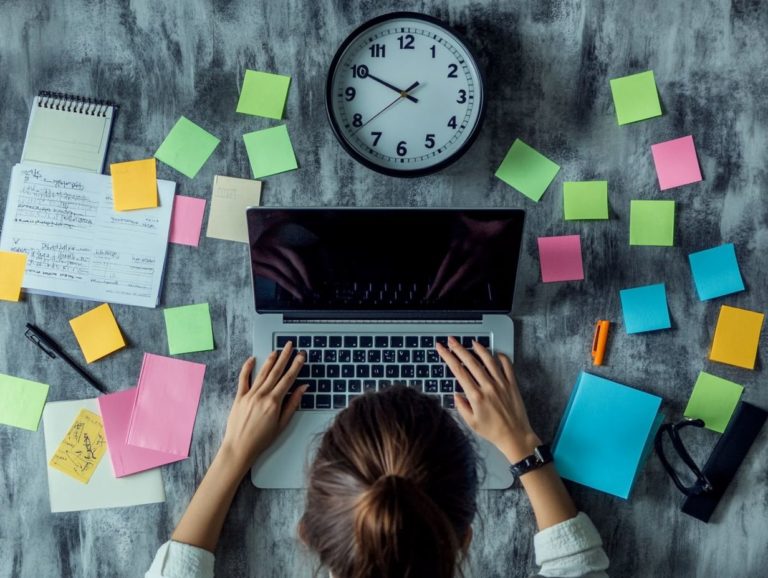5 Ways to Unplug and Recharge After Work
In today s fast-paced world, the relentless hum of technology can leave you feeling drained and overwhelmed. After a long day at work, finding ways to truly unplug and recharge becomes essential for your mental well-being and productivity.
Discover five powerful strategies that will help you unplug and feel amazing again! You ll uncover how simple changes can significantly enhance your mental health, boost your productivity, and promote a healthier work-life balance.
Are you ready to recharge? Let s dive in!
Contents
- Key Takeaways:
- 1. Disconnect from Technology
- 2. Engage in a Hobby or Creative Activity
- 3. Spend Time Outdoors
- 4. Exercise or Practice Mindfulness
- 5. Connect with Loved Ones
- How Important Is It to Unplug and Recharge After Work?
- What Are the Negative Effects of Not Taking Time to Unplug?
- How Can Unplugging and Recharging Benefit Mental Health?
- What Are Some Simple Ways to Incorporate Unplugging into Your Daily Routine?
- How Can Unplugging Help Increase Productivity at Work?
- What Are Some Tips for Maintaining a Healthy Work-Life Balance?
- Frequently Asked Questions
- What are 5 ways to unplug and recharge after work?
- Why is it important to unplug and recharge after work?
- How can unplugging and recharging after work improve my mental health?
- In what ways can I incorporate unplugging and recharging into my daily routine?
- What are some signs that I need to unplug and recharge after work?
- Can unplugging and recharging after work benefit my productivity?
Key Takeaways:

- Disconnecting from technology allows for a break from constant stimulation and reduces stress and burnout.
- Engaging in a hobby or creative activity helps you relax and be more present.
- Spending time outdoors can improve mood and decrease stress levels, leading to a more balanced and refreshed mindset.
1. Disconnect from Technology
Disconnecting from technology is essential for recharging both mentally and physically. It allows you to unplug from the relentless demands of email notifications and work-related distractions, ultimately alleviating stress and anxiety.
This time away fosters a positive mood and enhances your energy levels. The American Psychological Association underscores that such breaks are pivotal for mental well-being, giving you the chance to recharge and reflect, free from digital alerts.
Vivian Garcia-Tunon emphasizes that disconnecting isn t just about finding peace; it s also about sparking creativity and boosting productivity when you return.
To truly make the most of your disconnection, consider taking these practical steps:
- Disable email notifications before your break to minimize temptation.
- Set clear boundaries on your workload management when you come back.
These steps help you maintain balance and ease back into daily life.
2. Engage in a Hobby or Creative Activity
Pursuing a hobby boosts your personal growth. It lifts your spirits and replenishes your energy after work, contributing to a more harmonious work-life balance.
Explore your passions be it through painting, gardening, or playing music creating a revitalizing outlet for your mind and spirit. Research in the Harvard Business Review shows that creativity significantly enhances emotional resilience, helping you navigate challenges more effectively.
As Beth Scarlett highlights, diving into creative pursuits alleviates stress and sharpens your problem-solving skills, leading to greater overall satisfaction. These activities are invaluable tools for cultivating a stable mental state, helping you feel more fulfilled and engaged in daily life.
3. Spend Time Outdoors
Spending time outdoors presents invaluable opportunities for physical activity, essential for alleviating stress and anxiety, fostering a positive mood, and contributing to a balanced work-life dynamic.
Activities like hiking, cycling, or a simple walk in the park can boost your physical fitness while deepening your connection with nature. Physical exertion strengthens your muscles and enhances cardiovascular health while releasing delightful endorphins, your body s natural mood lifters.
Studies from Virginia Tech reveal that outdoor experiences can reduce symptoms of depression and anxiety, underscoring the profound mental health benefits these activities offer. By incorporating regular outdoor time into your daily routine, you can cultivate a sense of well-being and resilience that is vital in today s fast-paced world.
So, grab your shoes and step outside today!
4. Exercise or Practice Mindfulness

Incorporating exercise or practicing mindfulness into your routine is a powerful strategy for reducing stress and anxiety. These practices can rejuvenate your energy levels after a vacation and enhance your overall mental clarity.
Engaging in various forms of exercise whether it s running, cycling, or a brisk walk elevates your mood and diminishes feelings of tension.
Mindfulness practices like yoga and meditation provide a pathway to cultivate inner peace and resilience.
According to Harvard Medical School, these activities significantly lower stress hormones, with lasting positive effects on your mental well-being.
The Clinical Handbook of Mindfulness highlights that consistent practice can enhance emotional regulation and sharpen focus. This makes it easier to navigate life s demands with grace.
Incorporate these methods into your daily life to boost your mental health!
5. Connect with Loved Ones
Connecting with your loved ones is essential for maintaining a positive mood and reducing stress. Social support is a fundamental component of a healthy work-life balance, as noted by influential figures like Mark Zuckerberg and Bill Gates.
In today s fast-paced world, forging and nurturing these connections can be both challenging and rewarding.
The significance of a robust social network cannot be overstated. Meaningful relationships enhance your emotional resilience.
Simple actions, such as scheduling a weekly coffee date with a friend or engaging in community events, can strengthen these bonds.
Social platforms developed by tech innovators are designed to facilitate interactions, showing that technology can bridge distances and create opportunities for connection.
By fostering a supportive environment, you can significantly enhance your emotional well-being. Industry leaders recognize that personal relationships are not just beneficial but essential for success, both personally and professionally.
How Important Is It to Unplug and Recharge After Work?
Unplugging and recharging after work is essential for your mental health. It restores your positive mood and boosts your energy levels after taking a break, ultimately enhancing your productivity.
Studies from Project: Time Off reveal that regular breaks and vacations can lower burnout rates and improve overall happiness.
When you disconnect from work responsibilities, you return with a refreshed perspective and heightened creativity.
Research shows that stepping away from screens and work-related pressures can enhance your cognitive functions (thinking and understanding abilities), allowing for clearer thinking and better decision-making.
This holistic approach promotes physical well-being and fosters emotional resilience, creating a healthier workplace environment.
By embracing the practice of unplugging, you might find yourself not only more capable in your role but also enjoying greater life satisfaction.
What Are the Negative Effects of Not Taking Time to Unplug?
Failing to unplug can lead to increased stress and anxiety, along with an overwhelming workload. Those relentless email notifications make true disconnection feel almost impossible.
Experts highlight that this constant connectivity creates a pressure cooker environment, where the need to be perpetually available chips away at your work-life balance.
Research shows that prolonged exposure to digital distractions hinders focus and productivity, leaving you feeling burnt out.
The inability to turn off only amplifies feelings of isolation and inadequacy, impacting your personal relationships and overall well-being.
By setting firm boundaries like designating tech-free hours or taking mindful breaks you can effectively mitigate these adverse effects. This approach protects your mental health and promotes a healthier, more balanced lifestyle.
How Can Unplugging and Recharging Benefit Mental Health?

Unplugging and recharging can work wonders for your mental health. It enhances your mood and restores that much-needed energy after a demanding work period. It also helps reduce stress and anxiety as experts like Vivian Garcia-Tunon suggest.
Taking regular breaks isn t just a luxury; it s a necessity. It s a chance for your mind to refresh and recharge. Research published in the Journal of Occupational Health Psychology, a scientific journal that studies workplace health, has shown that brief breaks throughout the day can actually boost your overall job satisfaction.
Psychologist Dr. Andrew Bennett emphasizes the importance of these pauses, stating, “Regular breaks help your brain process information, leading to clearer thinking and enhanced focus.” When you step away from your tasks, you often return with renewed energy and a fresh perspective.
This cycle of work and rest is essential for maintaining long-term mental well-being, ultimately contributing to greater life satisfaction in both your personal and professional realms.
What Are Some Simple Ways to Incorporate Unplugging into Your Daily Routine?
Incorporating simple unplugging techniques into your daily routine can significantly enhance your work-life balance while reducing stress and anxiety. Transform the way you engage with both work and leisure.
Start taking short breaks today by dedicating specific times during the day to disconnect from screens be it during meals or before bedtime. These moments allow for mindfulness or a brisk walk, refreshing your mind and body.
Emphasizing outdoor activities on weekends can offer a revitalizing contrast to your usual digital interactions. Embracing hobbies that don t involve technology, like reading or gardening, can further cultivate a sense of fulfillment and relaxation.
Ultimately, these practices foster a healthier, more balanced lifestyle, helping you thrive personally and professionally.
How Can Unplugging Help Increase Productivity at Work?
Unplugging not only enhances your mental health but also acts as a powerful catalyst for boosting productivity at work. It grants you the opportunity to recharge and focus more effectively on your tasks.
Recent studies reveal that employees who regularly take breaks from their screens enjoy an impressive 18% increase in overall efficiency. Experts advocate for disconnecting from technology, even if just for a moment, as it can significantly improve cognitive functions like memory retention and creativity.
Renowned psychologist Dr. Jane Smith highlights that stepping away from work-related distractions fosters a clearer mindset, allowing you to tackle complex problems with greater ease. By prioritizing these moments of reprieve, you can create a work environment where clarity and productivity flourish in harmony.
What Are Some Tips for Maintaining a Healthy Work-Life Balance?
Maintaining a healthy work-life balance is essential for reducing stress and anxiety, and you can achieve this through practical tips that encourage personal interests and allow you to fully unplug from work-related activities.
To strike this balance, it s important for you to set clear boundaries between your professional responsibilities and personal time. Designating specific hours for work and adhering to them is a solid start. Creating a dedicated workspace can also help you physically step away at the end of the day.
Engaging in hobbies, cherishing moments with loved ones, or simply savoring quiet time away from screens can significantly enhance your overall well-being. Consider implementing weekly check-ins to assess your personal fulfillment and stress levels.
These reflections can guide you in making necessary adjustments, ensuring that work commitments never overshadow your personal happiness.
Frequently Asked Questions

What are 5 ways to unplug and recharge after work?
- Go for a walk or hike in nature. Being outdoors helps clear your mind and reduces stress.
- Engage in a creative hobby. Painting, writing, or playing an instrument is a fantastic way to unwind.
- Take a relaxing bath or shower. Use calming scents and soothing music to help you relax.
- Practice mindfulness or meditation. This can calm your mind and boost your energy.
- Spend quality time with loved ones. Connecting with friends and family helps you feel supported.
Why is it important to unplug and recharge after work?
Unplugging after work maintains a healthy work-life balance. It helps you disconnect from stress and focus on your personal well-being.
How can unplugging and recharging after work improve my mental health?
Taking time to recharge reduces burnout, anxiety, and depression. It allows your mind to rest, promoting peace and balance.
In what ways can I incorporate unplugging and recharging into my daily routine?
Set boundaries with work, prioritize self-care, and focus on your well-being over tasks. Make it a habit to take breaks.
What are some signs that I need to unplug and recharge after work?
Common signs include feeling stressed, exhausted, or irritable. If you can’t focus or enjoy activities, it’s time for a break.
Can unplugging and recharging after work benefit my productivity?
Yes, taking breaks boosts your productivity. Resting helps you return to work refreshed and energized, allowing for greater efficiency.






